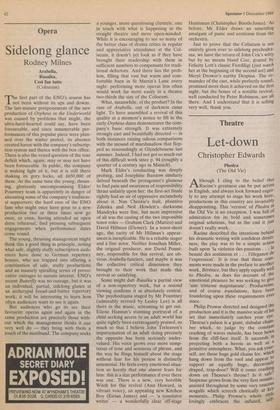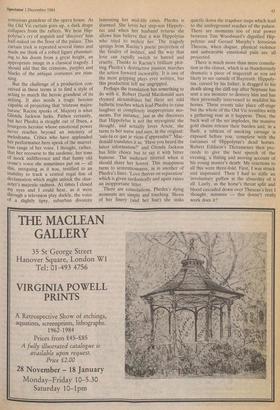Theatre
Let-down
Christopher Edwards
Phedra (The Old Vic) Although I cling to the belief that Racine's greatness can be put across in English, and always look forward eager- ly to any attempt to stage his work here, productions in this country are invariably disappointing. This 'version' of Phedra at the Old Vic is no exception. I was full of admiration for its bold and sometimes original solutions, but in the end it just doesn't really work. Racine described the intentions behind his dramatic writing with confident direct- ness; the play was to be a simple action built upon `la violence des passions . . • la beaute des sentimens et . . . l'elegance de l'expression'. It is true that these awl' ments were made in the preface to another work, Berenice, but they apply equally well to Phedra, as does his account of the emotional pleasure he was seeking to give 'tine tristesse majestueuse'. Productions, and of course translations, have been foundering upon these requirements ever since.
Philip. Prowse directed and designed the production and it is the massive scale of his set that immediately catches your eye' Theseus's palace is a giant, slabular chain" ber which, to judge by the constant crashing of waves outside, has been he'''n from the cliff-face itself. It succeeds in projecting both a heroic as well as a primitive atmosphere. What, you ask your" self, are those huge gold chains for, which hang down from the roof and appear to support an equally huge, decorously draped, trap-door? Will it come crashing down on Theseus's throne? Is it safe• Suspense grows from the very first minute, assisted throughout by some very raucous seagulls which screech chorically at key moments. Philip Prowse's whole style lovingly embraces the inflated, self conscious grandeur of the opera house. As the Old Vic curtain goes up, a dark drape collapses from the rafters. We hear Hip- polytus's cry of anguish and 'discover' him half-naked on the floor of the palace. This curtain trick is repeated several times and made me think of a robed figure plummet- ing to his doom from a great height, an appropriate image in a classical tragedy. I should add that the crimsons, purples and blacks of the antique costumes are stun- ning.
But the challenge of a production con- ceived in these terms is to find a style of acting to match the heroic grandeur of its setting. It also needs a tragic heroine capable of projecting that `tristesse majes- tueuse' Racine speaks of. Majesty is what Glenda Jackson lacks. Pathos certainly, but her Phedra is straight out of Ibsen, a bourgeois heroine whose emotional power never reaches beyond an intensity of melodrama. Critics who have applauded her performance here speak of the marvel- lous range of her voice. I thought, rather, that her recourse to the sardonic, her tone of mock indifference and that funny old crone's voice she sometimes put on — all this, intriguing as it was, testified to an inability to track a central regal line of declamation which might unlock the char- acter's majestic sadness. At times I closed my eyes and I could hear, as it were through a television play darkly, the voice of a slightly tipsy, suburban divorcee lamenting her mid-life crisis. Phedra is doomed. She loves her step-son Hippoly- tus and when her husband returns she allows him believe that it was Hippolytus who tried to molest her. The tragedy springs from Racine's poetic projection of the fatality of instinct, and the way that love can rapidly switch to hatred and cruelty. Thanks to Racine's brilliant plot- ting Phedra's destructive passion marches the action forward inexorably. It is one of the most gripping plays ever written, but this production left me ungripped.
Perhaps the translation has something to do with it. Robert David Macdonald uses rhymed alexandrines but there are odd bathetic touches which lead Phedra to raise laughter at completely inappropriate mo- ments. For instance, just as she discovers that Hippolytus is not the mysoginist she thought, and actually loves Aricie, she turns to her nurse and says, in the original: `sais-tu ce que je viens d'apprendre?' Mac- donald translates it as: 'Have you heard the latest information?' and Glenda Jackson has little choice but to say it with bitter humour. The audience tittered when it should share her horror. This snappiness turns to sententiousness, as in another of Phedra's lines: 'Love thrives on separation' which is given sardonically and again raises an inopportune titter.
There are consolations. Phedra's dying moments are simple and touching. Shorn of her finery (and her hair) she sinks quietly down the trapdoor steps which lead to the underground reaches of the palace. There are moments too of real power between Tim Woodward's dignified Hip- polytus and Gerard Murphy's ferocious Theseus, when disgust, physical violence and unbearable emotional pain are all projected.
There is much more than mere consola- tion in the climax, which is as thunderously dramatic a piece of stagecraft as you are likely to see outside of Bayreuth. Hippoly- tus, cursed by his father, is dragged to his death along the cliff-top after Neptune has sent a sea monster to destroy him and has then personally intervened to madden his horses. These events take place off-stage but the whole of the Old Vic trembles with a gathering roar as it happens. Then, the back wall of the set implodes, the massive gold chains release their burden and, in a flash, a tableau of smoking carnage is exposed before you, complete with the carcasses of Hippolytus's dead horses. Robert Eddison's Theramenes then pro- ceeds to give the best speech of the evening, a fluting and moving account of his young master's death. My reactions to all this were three-fold. First, I was struck and impressed. Then I had to stifle an involuntary guffaw at the absurdity of it all. Lastly, as the horse's throat split and blood cascaded down over Theseus's feet I thought, mmmnn — this doesn't really work does it?























































 Previous page
Previous page